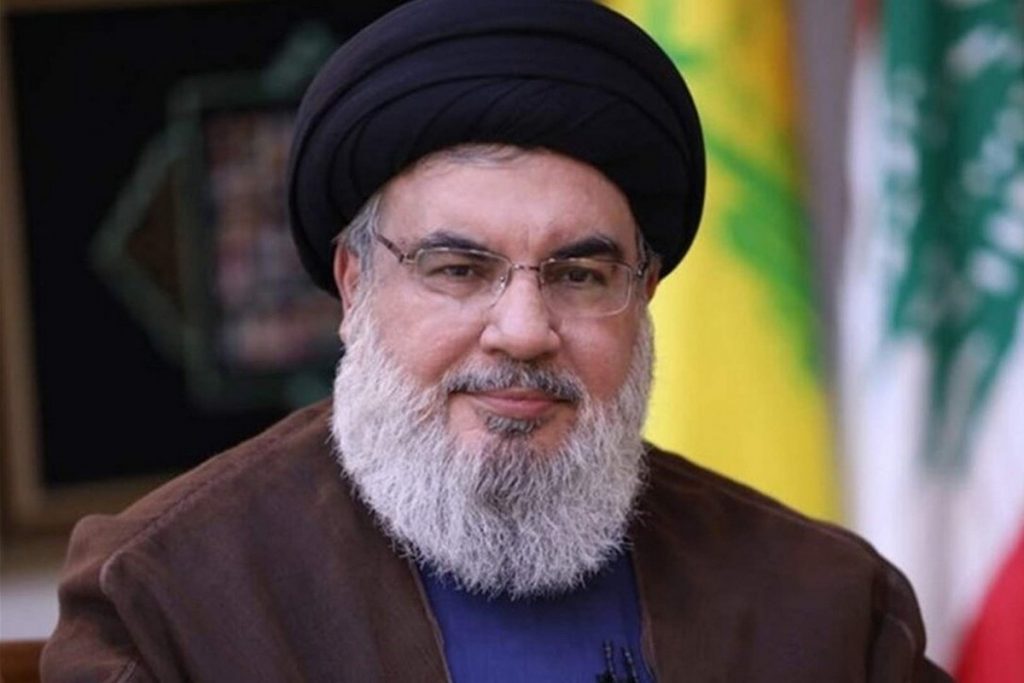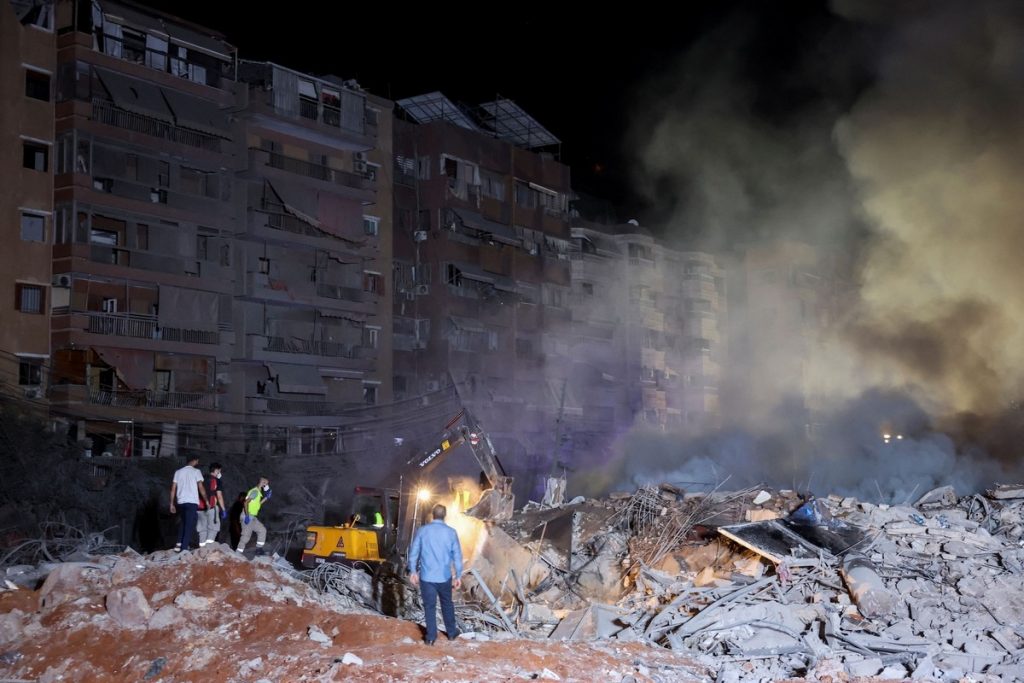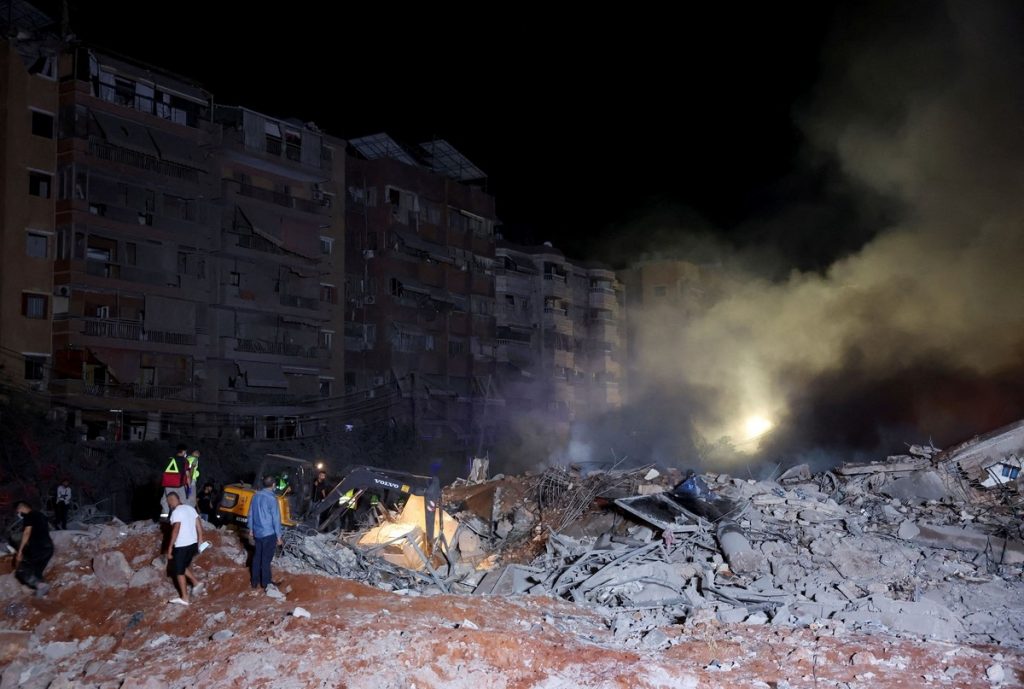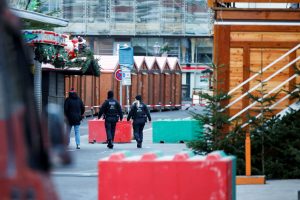Israel targeted Hezbollah leader Hassan Nasrallah with a massive airstrike on Beirut’s southern suburbs Friday, people briefed on the attack said, flattening part of a neighborhood in an attempt to kill the cleric who has led the group for three decades and built it into a fearsome foe.
It wasn’t immediately clear whether Nasrallah had been killed, but the explosions pulverized several buildings under which Israel’s military said Hezbollah’s main headquarters was hidden. Large plumes of smoke filled the sky as the sun began to set.
Ali al-Harakah, a municipal official in the area, said a large number of explosions hit the Haret Hreik neighborhood of the southern suburbs, destroying a number of buildings. He said he expected a large number of casualties given the scale of the damage.
Senior officials from Hezbollah and Iran’s Islamic Revolutionary Guard Corps were also at the site, people familiar with the matter said. Hezbollah has lost touch with several senior officials following the blast, some of the people said.
The attack was Israel’s most aggressive move yet in two weeks of elaborate intelligence operations , targeted killings and heavy bombardments aimed at stopping Hezbollah from attacking across the Lebanese border into Israel.
Nasrallah’s death would be an enormous blow not only to the group he leads, but to its main backer, Iran, and the wider network of aligned militias that Tehran has built across the Middle East to confront Israel. It also would be the strongest signal yet that Hezbollah has been thoroughly penetrated by Israeli intelligence.
Nasrallah oversaw Hezbollah’s transformation into the world’s most heavily armed nonstate militia and its integration into Lebanon’s political system.

He has found himself increasingly isolated in recent weeks by Israel’s relentless campaign of targeted killings of his most trusted fighters. Israel killed top lieutenant Fuad Shukr , who had eluded the U.S. for four decades, in an airstrike this past summer on his apartment on the upper floors of a southern Beirut residential building, where he had been summoned by a phone call shortly before.
Thousands of Hezbollah pagers and walkie-talkies exploded virtually simultaneously last week, killing 37 and injuring around 3,000. Shortly afterward, an airstrike in Beirut killed a group of more than a dozen elite military leaders. Airstrikes in southern Beirut this week killed Hezbollah’s top missile commander and another commander in the group’s aerial unit.
Hezbollah began firing across the border shortly after the Hamas-led Oct. 7 attacks on southern Israel that killed 1,200 and sparked the war in Gaza. The two foes have traded fire on an almost daily basis since then, depopulating strips along both sides of the border and raising concerns of escalation into a wide war.
Israel stepped up its attacks over the summer and sharply escalated them over the past two weeks, as pressure has built on the government to return residents evacuated from the north to their homes.
The explosions heard across Beirut around 6:20 p.m. local time Friday likely represented the largest Israeli strike on the Lebanese capital since last October.
The smell of burning debris hung in the air in the vicinity of the strike. Flashing lights of ambulances and firetrucks glinted off otherwise darkened buildings, and medics in orange vests attended to a woman sitting in a plastic chair on the sidewalk several blocks away. Hezbollah members in civilian clothes stood at metal barricades blocking streets leading to the site of the attack.

“There was a strike in there, so you stay here,” said one of the men, dressed in a black shirt and stationed at a metal barricade near the scene of the strike.
The strike came shortly after Israeli Prime Minister Benjamin Netanyahu addressed the United Nations General Assembly in New York. “We will not accept a terror army perched on our northern border able to perpetrate another Oct. 7-style massacre,” Netanyahu said.
Netanyahu’s speech came before a largely empty U.N. chamber, after dozens of diplomats walked out when it was announced that Netanyahu was next to speak. His comment came amid U.S.-led efforts to seek a diplomatic solution before all-out war breaks out.
Netanyahu pushed back Thursday on the idea that a cease-fire might be close at hand. On Friday, his office said that U.S. and Israeli officials had met to discuss the U.S. initiative and that the talks were expected to continue in the coming days. The statement didn’t explicitly endorse the idea of a cease-fire.
“Israel shares the aims of the U.S.-led initiative of enabling people along our northern border to return safely and securely to their homes,” his office said.
U.S. Defense Secretary Lloyd Austin warned of the consequences if a cease-fire deal wasn’t reached.
“An all-out war between Lebanese, Hezbollah and Israel would be devastating for both Lebanon and Israel. And again, we anticipate that we’d see a number of people displaced, casualties that, you know, equal or exceed what we’ve seen in Gaza,” Austin told CNN’s Wolf Blitzer on Friday.
The Israeli military goals of the current campaign against Hezbollah are to degrade the militant group’s capabilities, eliminate its military leadership and clear the area near the border with Israel to allow for the return of evacuated residents of northern Israel to their homes, an Israeli security official said Friday.
Israeli strikes have killed more than 600 people since Monday, including scores of women and children, and injured around 2,000, according to Lebanon’s Ministry of Health.

More than 200,000 people have been displaced in Lebanon as a result of the conflict with Israel since October, with about 100,000 newly displaced people in the past week, some moving for a second time, according to a report from the International Organization for Migration.
Israel said Friday that rockets were fired from Lebanon toward the areas of Haifa and the Krayot. Hezbollah has fired more than 9,000 rockets, missiles and drones into Israel since Oct. 8, according to Israel. The Israeli military struck Lebanon more than 8,000 times by air, drone, missile and artillery through Sept. 20, before the latest round of heavy Israeli bombardment, according to the nonprofit Armed Conflict Location and Event Data.


